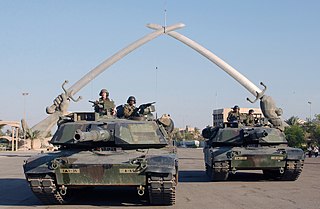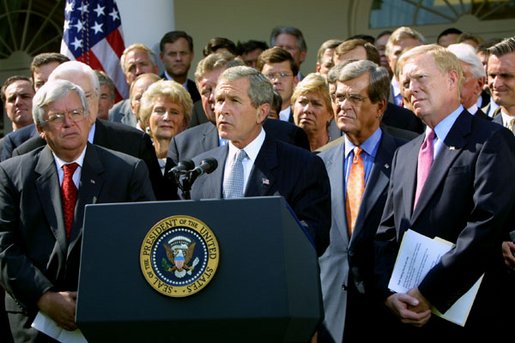
The Iraq disarmament crisis was claimed as one of primary issues that led to the multinational invasion of Iraq on 20 March 2003. Since the 1980s, Iraq was widely assumed to have been producing and extensively running the programs of biological, chemical and nuclear weapons. During the heights of Iran–Iraq War, Iraq had used its offensive chemical program against Iran and Kurdish civilians, also in the 1980s. With the French and Soviet assistance given to Iraqi nuclear program, its primary facility was secretly destroyed by Israel in 1981.

The United Nations Monitoring, Verification and Inspection Commission (UNMOVIC) was created through the adoption of United Nations Security Council resolution 1284 of 17 December 1999 and its mission lasted until June 2007.

United Nations Security Council Resolution 1441 is a United Nations Security Council resolution adopted unanimously by the United Nations Security Council on 8 November 2002, offering Iraq under Saddam Hussein "a final opportunity to comply with its disarmament obligations" that had been set out in several previous resolutions. It provided a justification for what was subsequently termed the US invasion of Iraq.

In March 2003 the United States government announced that "diplomacy has failed" and that it would proceed with a "coalition of the willing" to rid Iraq under Saddam Hussein of weapons of mass destruction the US insisted it possessed. The 2003 invasion of Iraq began a few days later.

The War Powers Resolution is a federal law intended to check the president's power to commit the United States to an armed conflict without the consent of the U.S. Congress. The Resolution was adopted in the form of a United States Congress joint resolution. It provides that the U.S. President can send U.S. Armed Forces into action abroad only by declaration of war by Congress, "statutory authorization," or in case of "a national emergency created by attack upon the United States, its territories or possessions, or its armed forces."

The United States of America is a charter member of the United Nations and one of five permanent members of the UN Security Council.

Carl Milton Levin is an American attorney and retired politician who served as a United States Senator from Michigan from 1979 to 2015. He was the chair of the Senate Committee on Armed Services and is a member of the Democratic Party.

A declaration of war is a formal declaration issued by a national government indicating that a state of war exists between that nation and another. The document Declarations of War and Authorizations for the Use of Military Force: Historical Background and Legal Implications gives an extensive listing and summary of statutes which are automatically engaged upon the US declaring war.

United Nations Security Council Resolution 678, adopted on 29 November 1990, after reaffirming resolutions 660, 661, 662, 664, 665, 666, 667, 669, 670, 674 and 677, the Council noted that despite all the United Nations efforts, Iraq continued to defy the Security Council.

The Iraq Liberation Act of 1998 is a United States Congressional statement of policy stating that "It should be the policy of the United States to support efforts to remove the regime headed by Saddam Hussein from power in Iraq ..." It was signed into law by President Bill Clinton, and states that it is the policy of the United States to support democratic movements within Iraq. The Act was cited in October 2002 to argue for the authorization of military force against the Iraqi government.
Events in the year 2002 in Iraq.
The use of force by states is controlled by both customary international law and by treaty law. The UN Charter reads in article 2(4):
All members shall refrain in their international relations from the threat or use of force against the territorial integrity or political independence of any state, or in any other manner inconsistent with the purposes of the United Nations.

A dispute exists over the legitimacy of the 2003 invasion of Iraq. The debate centers around the question whether the invasion was an unprovoked assault on an independent country that may have breached international law, or if the United Nations Security Council authorized the invasion. Those arguing for its legitimacy often point to Congressional Joint Resolution 114 and UN Security Council resolutions, such as Resolution 1441 and Resolution 678. Those arguing against its legitimacy also cite some of the same sources, stating they do not actually permit war but instead lay out conditions that must be met before war can be declared. Furthermore, the Security Council may only authorise the use of force against an "aggressor" in the interests of preserving peace, whereas the 2003 invasion of Iraq was not provoked by any aggressive military action.
The Kerry and Feingold Amendment proposed the withdrawal of American armed forces from Iraq by July 2007 with the exception of a few to maintain security. The proposal was defeated in the United States Senate in an 86 to 13 vote.
British Parliamentary approval for the invasion of Iraq was given by the elected members of the British House of Commons to Tony Blair's government on the eve of the 2003 invasion of Iraq, in a series of two votes, on 18 March 2003.
The Authorization for Use of Military Force (AUMF), Pub. L. 107-40, codified at 115 Stat. 224 and passed as S.J.Res. 23 by the United States Congress on September 14, 2001, authorizes the use of United States Armed Forces against those responsible for the attacks on September 11, 2001 and any "associated forces". The authorization granted the President the authority to use all "necessary and appropriate force" against those whom he determined "planned, authorized, committed or aided" the September 11th attacks, or who harbored said persons or groups. The AUMF was signed by President George W. Bush on September 18, 2001. In December 2016, the Office of the President published a brief interpreting the AUMF as providing Congressional authorization for the use of force against al-Qaeda and other militant groups.

The legality of the invasion and occupation of Iraq has been widely debated since the United States, United Kingdom, Australia, Poland and a coalition of other countries launched the 2003 invasion of Iraq. The then United Nations Secretary-General Kofi Annan stated in September 2004 that: "I have indicated it was not in conformity with the UN charter. From our point of view and the UN Charter point of view, it [the war] was illegal", explicitly declaring that the US-led war on Iraq was illegal.

Hillary Rodham Clinton served as a United States Senator from New York from January 3, 2001 to January 21, 2009. She won the United States Senate election in New York, 2000 and the United States Senate election in New York, 2006. Clinton resigned from the Senate on January 21, 2009 to become United States Secretary of State for the Obama Administration.
The Authorization for Use of Military Force Against Iraq Resolution or Joint Resolution to authorize the use of United States Armed Forces pursuant to United Nations Security Council Resolution 678, was the United States Congress's January 14, 1991 authorization of the use of U.S. military force in the Gulf War.
The National Defense Authorization Act (NDAA) for Fiscal Year 2013 is a United States federal law which specifies the budget and expenditures of the United States Department of Defense for Fiscal Year 2013. The full title is An Act to Authorize Appropriations for fiscal year 2013 for military activities of the Department of Defense, for military construction, and for defense activities of the Department of Energy, to prescribe military personnel strengths for such fiscal year, and for other purposes. This law has been assigned the number PL 112-239.
















